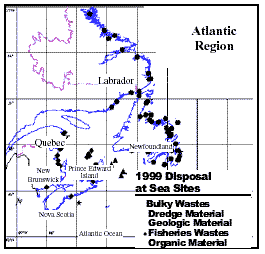Part VI: ocean disposal (CEPA sections 66-86)
Environment Canada regulates the disposal of substances at sea and meets the international obligations under the London Convention 1972 by means of the Ocean Dumping Regulations and a system of permits under Part VI.
Canada is committed to strong and effective controls on disposal at sea. Disposal at sea is permitted only for non-hazardous substances and where it is the environmentally preferable and practical alternative. Permits are not granted if practical opportunities are available to recycle, reuse or treat the waste. Environment Canada considers a number of factors before granting a permit, including:
- waste audits,
- alternatives to ocean disposal,
- potential environmental impacts, and
- conflicts with other legitimate uses of the sea.
| Material | Quantity (tonnes) | Permits issued | Percent of quantity | Percent of permits |
|---|---|---|---|---|
| Dredged material | 643 500 | 33 | 85 % | 41 % |
| Geologic material | 50 000 | 1 | 7 % | 1 % |
| Fish waste | 58 375 | 45 | 8 % | 55 % |
| Organic material | 200 | 1 | 1 % | 1 % |
| Bulky wastes | 411 | 2 | 1 % | 2 % |
| Total | 752 486 | 82 | 100 % | 100 % |
| Material | Atlantic | Quebec | Pacific | Northern | ||||
|---|---|---|---|---|---|---|---|---|
| Quantity (tonnes) |
Permits issued |
Quantity (tonnes) |
Permits issued |
Quantity (tonnes) |
Permits issued |
Quantity (tonnes) |
Permits issued |
|
| Dredged material | 352 300 | 12 | 50 700 | 9 | 240 500 | 12 | 0 | 0 |
| Geologic material | 50 000 | 1 | 0 | 0 | 0 | 0 | 0 | 0 |
| Fish waste | 55 825 | 41 | 2 550 | 4 | 0 | 0 | 0 | 0 |
| Organic material | 0 | 0 | 0 | 0 | 0 | 0 | 200 | 1 |
| Bulky wastes | 411 | 2 | 0 | 0 | 0 | 0 | 0 | 0 |
| Total | 458 536 | 56 | 53 250 | 13 | 240 500 | 12 | 200 | 1 |
Inert materials or uncontaminated materials of natural origin are considered suitable for ocean disposal. The majority of the material disposed at sea is dredged material that must be moved to keep shipping channels and harbours clear for navigation and commerce. Fish waste that cannot be recycled as fertilizer, animal feed or other products may be permitted for disposal at sea. Other wastes that may be considered suitable for ocean disposal include bulky wastes, such as concrete rubble, and decommisioned vessels.
During the 1999-2000 period, Environment Canada issued 83 permits for the disposal of an estimated 750 000 tonnes of material. This is the amount approved for disposal as opposed to the actual amount disposed of at sea, which may be less.
The total number of permits issued in 1999-2000 decreased by 20% from the year before, while the total quantity of material approved for disposal dropped by 92%. In March 1999, a new permit fee of $470 per 1000 cubic metres came into effect for dredged material and inert geologic material of natural origin, which resulted in the dramatic declines from previous amounts.


Page details
- Date modified: